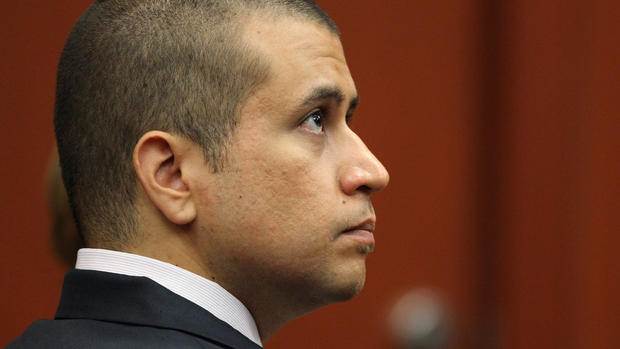George Zimmerman's head wounds after Trayvon Martin shooting likely bolster self-defense claims
Updated at 10:00 a.m. ET
(CBS News) Medical records showing that George Zimmerman was treated for a fractured nose and cuts to the back of his head after fatally shooting 17-year-old Trayvon Martin will likely bolster Zimmerman's argument that Martin attacked him, CBS News legal analyst Jack Ford said on "CBS This Morning" Wednesday.
The records came to light Tuesday. CBS News has also confirmed they show that Zimmerman had a pair of black eyes when he was examined by a doctor Feb. 27, the day after he shot Martin in a gated Florida community. Zimmerman, who has claimed self-defense, faces a charge of second-degree murder in the shooting.
"This now allows the defense to show up in the courtroom, let George Zimmerman tell his story and bring in a medical expert that says, 'Black and blue under the eyes, broken nose, cut on the back of the head,'" said Ford, "and the defense can argue that's consistent with George Zimmerman being attacked by Trayvon Martin, and then the Stand Your Ground defense comes into play."
Special Section: Trayvon Martin Shooting
Report: Trayvon Martin gun range targets sold online
Trayvon mom: Re-examine "Stand Your Ground" laws
Ford, a former prosecutor, said that the medical report's revelations, while not good for the prosecution, don't exactly torpedo their case.
"Here's what you're going to get: I'm sure the prosecution is going to say, 'Hey, you know what this shows? This shows that Trayvon Martin was fighting for his life because he was attacked by George Zimmerman here,'" said Ford, "and the defense is going to say, 'That's not so at all, and we've got the medical testimony to show it.'"
The medical report was first reported by ABC News.
The court documents also show that prior to the shooting, Zimmerman had received prescriptions for Adderall and Temazepam, which have been shown to cause agitation and mood swings, though in less than 10 percent of consumers.
The report also shows Zimmerman said he felt stressed and "occasional nausea when thinking about the violence." Despite the head injuries, he wasn't diagnosed with a concussion. The doctor recommended that Zimmerman be evaluated by a psychologist.
Zimmerman declined being admitted to a hospital for treatment on the night of the shooting, according to the report. He didn't take his doctor's advice to schedule a later visit with an ear, nose and throat physician. The doctor noted Zimmerman made the Feb. 27 appointment at Altamonte Family Practice to receive legal clearance for returning to work.
Zimmerman's medical records were among several pieces of evidence on a list the court released Tuesday. The list shows that prosecutors have also obtained security camera footage of Martin at a 7-11 convenience store. The confrontation between Martin and Zimmerman happened as Martin was carrying a bag of Skittles and an iced tea from a 7-11 through Zimmerman's gated community to a family friend's house.
Zimmerman, a neighborhood watch volunteer who regularly patrolled the Retreat at Twin Lakes community in Sanford, Fla., reported Martin as a suspicious person to the police, who urged him not to follow Martin. Prosecutors have also obtained Zimmerman's cell phone records and some text messages he sent in March.
Martin's cell phone records are also listed as evidence. Before Zimmerman was arrested, an attorney for Martin's parents said Martin told his girlfriend in a phone conversation that he thought he was being followed when someone confronted him minutes before the shooting.
Above, watch CBS News legal analyst Jack Ford break down the latest revelations from the Trayvon Martin shooting
